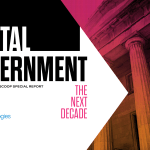Rebuilding our city infrastructure begins with municipal broadband

Imagine someone told you late last year that a global pandemic would infect nearly 12 million people, kill more than 500,000 and completely disrupt the way we function as a society. You might believe that the U.S. would be ill-prepared to deal with such a crisis, and indeed COVID-19 has revealed substantial weaknesses in our nation’s infrastructure — and I’m not referring to our roads and bridges.
This pandemic has dramatically changed our behavior, further distanced many from access to health care and food and amplified social inequities. Solving these problems will require a scalable digital framework that can support connectivity on a global scale. But with inaction at the federal level, this initiative must start in cities.
If we really want to combat climate change, poverty and homelessness, we must adopt a 21st century approach. Cities are doing all they can to support their economies during the pandemic, but in doing so they continue to overlook investments into areas that will help uplift underserved populations.
But some cities, like Chicago, are thinking differently.
Mayor Lori Lightfoot recently announced the launch of “Chicago Connected,” a $50 million program aiming to provide free high-speed internet to students over the next four years. The investment in broadband, specifically for students, is key as more K-12 districts and universities evaluate whether their fall semesters will take place online.
“We as a city can simply not afford to wait any longer to provide our residents the basics, they need to be successful, to be part of a city and the opportunities that this amazing city provides to all,” Lightfoot said.
And at Ignite Cities, we’re doing what we can to help. Together with Qualcomm and JLC Infrastructure, we announced a strategic collaboration that will offer cities $75 million to fund and develop smart and connected solutions.
If cities can successfully connect the masses and use smart and connected solutions to deliver better services for residents, then we envision a future in which technological innovation can support our underserved communities. If we want fundamental change, we must educate, train, inspire and reverse the current mindset. To do so will involve rebuilding social equity by removing children from the streets, igniting creativity, and most importantly, offering fair opportunities to all.
In addition to more direct funding for municipal broadband efforts, our cities need to subsidize digital connectivity as a utility on a sliding scale to provide access to all and support a new investment in people and their communities.
Technology has a critical role to play in guaranteeing access and social equity across neighborhoods. Technology may be the ultimate equalizer, providing tools to allow the delivery of food faster and cheaper, monitor and secure the health and wellness of people and ensure that everyone is alerted to safety concerns in a rapid manner.
As we move forward, I encourage you to acknowledge the people around you and to be aware of the possibility of the next pandemic or national crisis. Keep in mind that we must not only survive but thrive. When you provide access to one family, you enable its members to build their own future and find greatness. Then the investment can grow and spread across communities as it’s scaled to the masses.
By connecting everyone, we begin to build something bigger than infrastructure. We will allow cities the opportunity to truly serve the most important part of our country: people.
George Burciaga leads Ignite Cities, a global consulting practice that provides resources to mayors and city leaders pursuing “smart city” technologies.

This story was featured in StateScoop Special Report: Digital Government: The Next Decade (2020)






